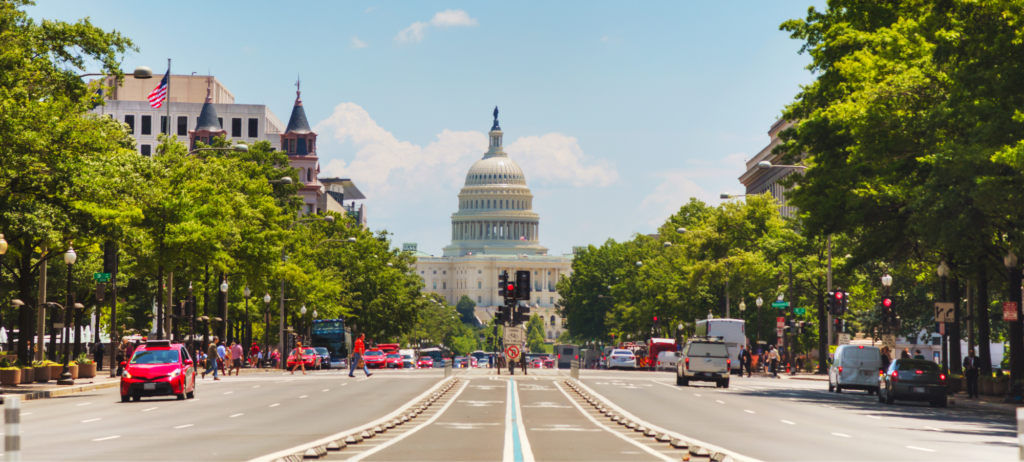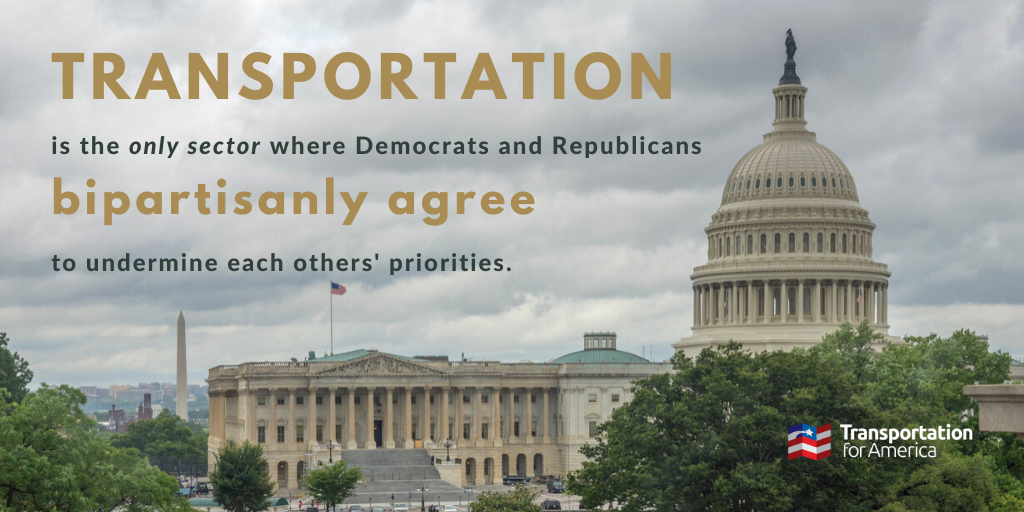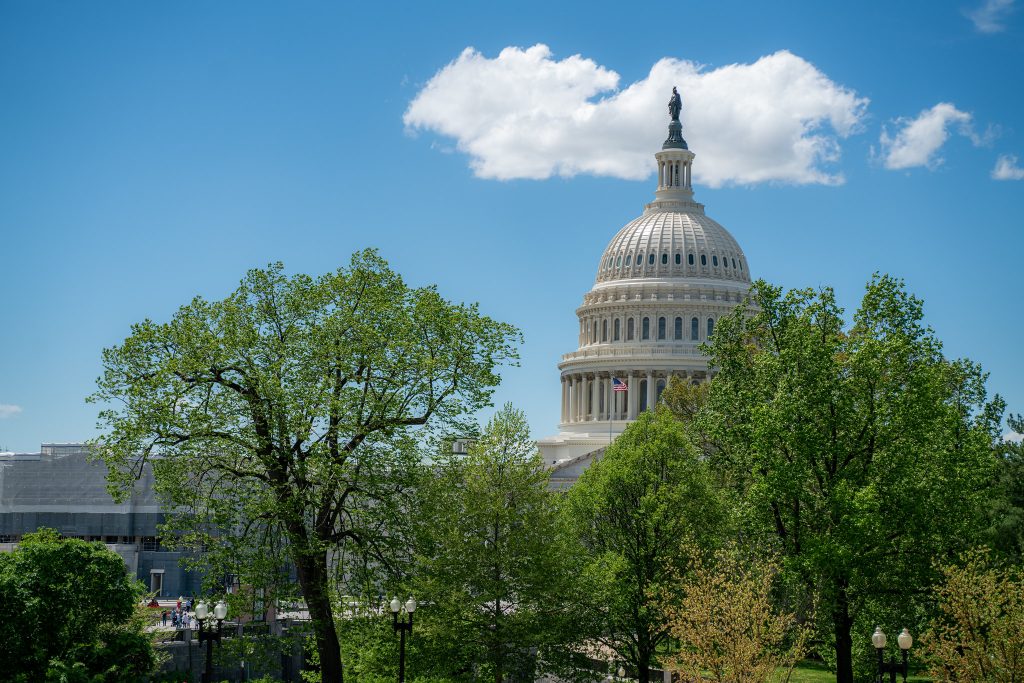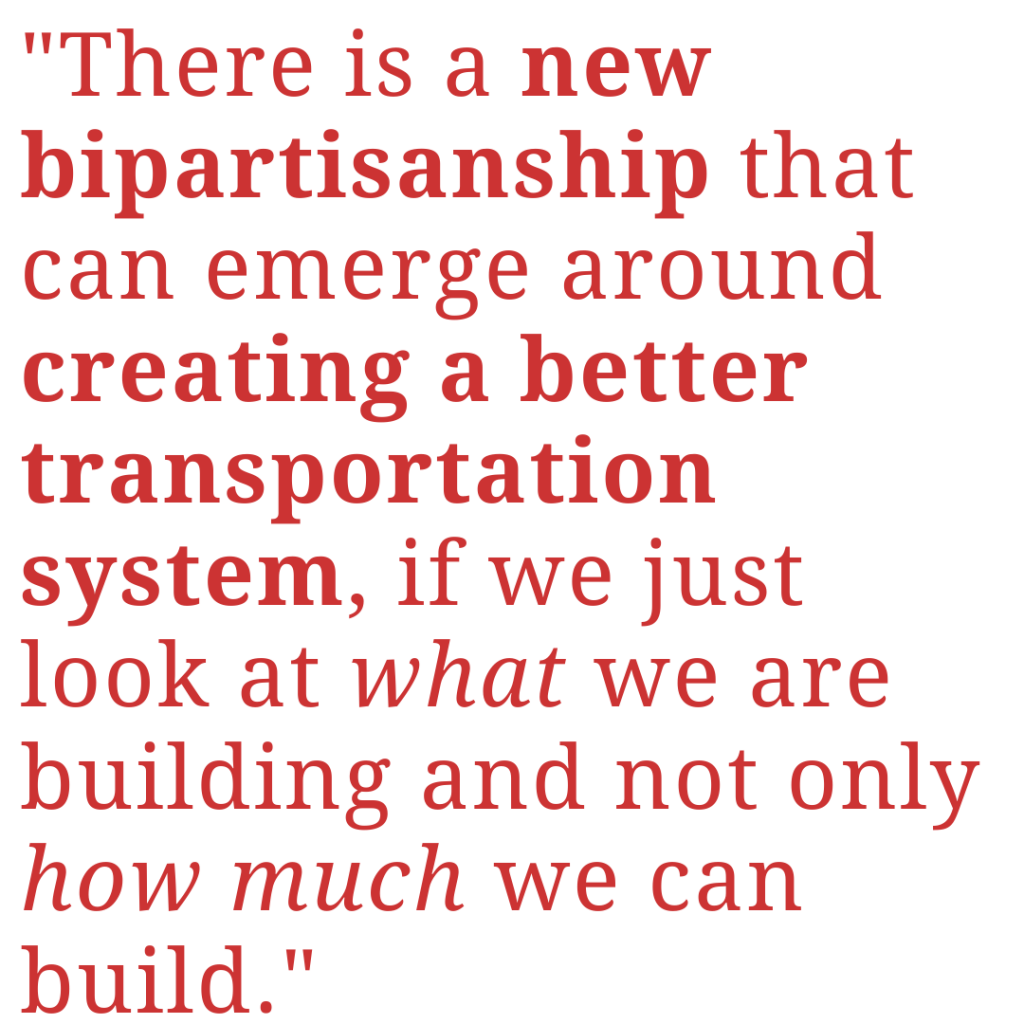
A bipartisan transportation bill isn’t always good: but it can be

Last summer, the Senate Environment and Public Works Committee passed a transportation bill lauded by both sides of the aisle. While the bill was indeed bipartisan, it does great damage to the priorities of both the Democrats and Republicans. Our director Beth Osborne explains why bipartisanship on its own doesn’t make a bill good, and how it’s possible to create a transportation bill that achieves both parties’ objectives.

“Blue Skies over the Capitol.” Photo by John Brighenti on Flickr’s Creative Commons
Transportation is the only sector where Democrats and Republicans enthusiastically and bipartisanly agree to undermine their own goals. While Republicans say their priority is to reduce demand for federal spending, avoid wasteful spending and efficiently move goods to market, the current program and the bill they passed fails to do so. While Democrats claim to want to create jobs, reduce emissions, and build a strong and fair economy, the current program and the bill they passed fails to do so. Still these laws have achieved one thing: bipartisanship.
It’s amazing that lawmakers can fail to achieve both parties’ goals in one bipartisan bill. It is obvious why in these divided times, members of Congress would seek and embrace an opportunity for bipartisanship. But is bipartisanship good if it is accomplished by trading so many of your priorities—your reasons for being in office—for an agreement that just makes our country’s problems worse?
In fairness, there are successes both sides can point to. The Democrats can say they are creating jobs even if they aren’t creating as many as they could. The Republicans can say they are reducing regulation even if they are only reducing some parts of the environmental review and permitting processes (and not always the most onerous parts). Both can say they are fixing our crumbling infrastructure even if there is no requirement to do so—which is why that federal funding is often spent on road expansions (that we can’t afford to maintain) instead.
Why is this? First, unlike most other federal programs, lawmakers don’t have to justify funding the transportation program annually because it’s paid for by a trust fund. Money moves out to states, metropolitan planning organizations and transit agencies every year whether the annual spending bills are passed or not. When you don’t have to think about a program but every six or so years, it is hardly surprising that most members of Congress don’t fully understand how it works or what might need to change.
Second, passing these bills leads to a lot of praise from the industry that will make a lot of money from it. The press covers all the money coming home, and often little else. The eventual spending leads to ribbon cuttings, which provides even more good press—even if that infrastructure is fated to fall into disrepair for the same reasons we have a repair problem today.
Transportation is more complicated and nuanced than we appreciate. Building new roads and bridges doesn’t always make travel faster or more convenient—it often makes travel worse and creates hardship on the communities they touch. And investing in maintenance and transit operations actually creates more jobs than new road and bridge construction projects.
 It’s time for Democrats and Republicans—and more of the press—to think about what a transportation program can and should achieve: access to jobs for rich and poor, a safe travel environment for those in and out of a car, and a well-maintained system. None of these goals are partisan. Democrats and Republicans may come to each priority for slightly different reasons, but there is a new bipartisanship that can emerge around creating a better transportation system if we just look at what we are building and not just how much we can build.
It’s time for Democrats and Republicans—and more of the press—to think about what a transportation program can and should achieve: access to jobs for rich and poor, a safe travel environment for those in and out of a car, and a well-maintained system. None of these goals are partisan. Democrats and Republicans may come to each priority for slightly different reasons, but there is a new bipartisanship that can emerge around creating a better transportation system if we just look at what we are building and not just how much we can build.
We can follow the lead of two junior members of the House—Representatives Jesús “Chuy” García (a Democrat) and Mike Gallagher (a Republican)—who are both freshmen members of the House Transportation and Infrastructure Committee. With the current transportation program expiring this September, the Committee had a chance to rethink long-term transportation policy and came up with a proposal that included a fix-it-first approach. Representatives García and Gallagher did something unusual: they considered the continuing problem in solving our transportation maintenance problems and connected policy to spending to solve that problem. The two Congressmen submitted an amendment to the reauthorization bill, called the INVEST Act, to require that states spend funding on maintenance before building new roads, which was then adopted unanimously.
Prioritizing maintenance over road expansion is a win-win for both Democrats and Republicans: Democrats reduce carbon emissions from unnecessary road building, Republicans spend taxpayer dollars responsibly by reducing our future liabilities, and both parties create more jobs—more than would be created from new road construction. This is bipartisanship to praise.
The Senate bill does not include this approach, allowing states and regions to build infrastructure they cannot afford to maintain while they are failing to maintain their existing system. But it is bipartisan! This is bipartisanship to shake your head at. The Senate needs to do better. And we all should recognize that bipartisanship can be a cover for failure to think deeply about a program and an excuse to avoid improvement.



